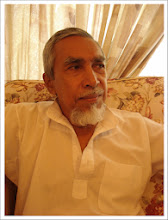1. I believe my father was an assertive person.
There were times when he had fights with office holders in the course of
carrying out his duties. On account of his assertiveness, I suppose he was occasionally
affected by office politics. This happened particularly when he was holding the
post of Senior Auditor, North Kedah.
2. Apparently he might
have been deemed a source of contention. Sometime in mid-January of 1916 he was
recommended to be transferred to the post of Senior Auditor, South Kedah. In connection
with the transfer, I was particularly curious over a remark noted by the British
Adviser (Adviser) to the Regent, thus:
“After Ismail Merican’s performance in the case against Said Jan, I cannot agree to his going to South Kedah when there is no one to look after him. The Auditor General had better recommend someone else for South Kedah.”
3. In the meantime, towards the end of January,
my father was prompted to make a report of threats made by one Mr. Stuart
probably following an argument he had with the latter. This is evident from a
file I found in the Archives
regarding the matter of “Che Ismail Merican, Senior Auditor, North Kedah,
reports regarding the threats made by Mr. Stuart.”
4. It was a pity that copy of the report was
missing from the file, so we would never find out the truth about the threat.
However, Stuart wrote quite a lengthy letter explaining the situation to the
Adviser. Stuart’s explanation seemed to understate the report inasmuch as inducing
the Adviser to note a remark to the Regent, thus:
It is not worth a long correspondence. Ismail Merican is not a child and should be told not to make childish complaints.
5. My father might have gone to Sungai Petani for a while if at all.
He had gone on leave as from April through August, 1916. Hence, the Audit Office, South Kedah was asked to be closed during
his absence on leave.
6. However, his rendezvous with Sungai Petani would recur about six
years later when he
was appointed Assistant Superintendent Monopolies and Customs to the town in
October 1922. Incidentally, just before the transfer he was appointed to carry out the work of
special Translator of Enactments etc.
7. The Adviser would rather he were
seconded to the Legal Adviser’s office to carry out the work, but the State Council
decided on a temporary expediency that he should be called upon to assist in
translation work in addition to his other duties.
8. Subsequently, in November 1923 he
was seconded to the Legal Adviser’s office as Assistant to the Legal Adviser.
However, the title of the appointment became an issue due to differences of
opinion. In 1926 it was downgraded to “Office Assistant, Legal Adviser” because
the LA at the time was of the opinion that “the duties (of the appointment)
consisted almost entirely of translation work with a little simple drafting.”
9. About five years later, another
LA had proposed that “Assistant to Legal Adviser” was an apt title for the
appointment because in his opinion “an Office Assistant was more of a supervisor
whereas that of Mr. Merican was essentially collaboration with the Legal
Adviser.” Thus the appointment was once again described as “Assistant to Legal
Adviser.”
10. Later in his mid-60s my father would again faced the irony of
office politics. It began with a letter of request for “increased pension and additional
gratuity” which he wrote in May 1946 and ended with an unfavourable
reply which he received in September 1948. Over a span of almost 28 months,
departments’ correspondence implied a tug-of-war between Kedah State
Secretariat and Federal Secretariat (Malayan Union Government).
11. My father retired on pension in 1937 and was recalled to duty by the Kedah State
Council during the Japanese Occupation at the age of 60. He was appointed Legal
Adviser and Public Prosecutor and became a member of the State Council.
12. He forwarded
his request by reason
of his re-employment from 10 February 1942 to 31 August 1946. He hoped
that the Government would take into account his additional service of over four
years during war-time and BMA for the purpose of computing his increased
pension and additional gratuity.
13. But in spite of the
favourable recommendation from the Resident Commissioner, Kedah as well as the Kedah
State Secretariat, his request was not approved by the Federal Secretariat. As the
French proverb goes: “Gratitude is the least of
virtues; ingratitude the worst of vices.”











No comments:
Post a Comment